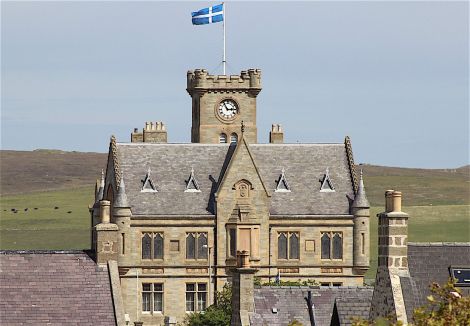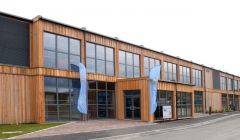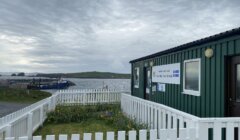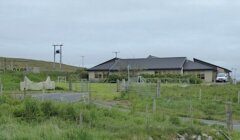Council / SIC leadership confident five-year plan will be a success
“SHETLAND is a beautiful place to live – our challenge is to make sure we continue to deliver that into the future.”
That is the message from Shetland Islands Council (SIC) leader Steven Coutts about the local authority’s new corporate plan which maps out the priorities for the next five years.
The plan, which can be viewed here, was approved by councillors yesterday (Wednesday) and aims to provide the political direction for the SIC through to 2026.
Among the mix are topics such as employment, population, housing, connectivity, skills, climate change…the list goes on.
Speaking in a briefing with local media after yesterday’s full council meeting, Coutts was confident that the council will deliver on the objectives in the plan despite elected members receiving on the same day a “stark warning” about how the SIC’s finances could look in years to come without intervention.
“The first step is to set out the ambition,” he said when asked what promises could be made over the objectives.
“Yes, it will be challenging to deliver it. It will need a mix of political engagement to ensure that we’ve got the adequate relationships in place with government and we get the adequate funding to deliver that, based on what the local community needs.”
Coutts said the new plan was more “Shetland-focused” than its predecessor, which he said was more organisational.
When asked if the last plan was a success, the leader said: “This is a more holistic plan I would suggest than our last one. We had a number of key projects to deliver, and number one among those was the Anderson High School.
“What we did do with that last plan was deliver it, so we’ve got that confidence that when we set the plan we can deliver it. This will be refocused.
Become a member of Shetland News
“I think it will be more challenging, I think it is more ambitious, but I think that’s exactly what the community of Shetland needs at this time. Moving forward we’ll clearly monitor it and report back on the progress, because the plan is no use if it just sits on the bookshelf and doesn’t make a difference to the folk of Shetland.”
Chairman of the council’s education and families committee George Smith, meanwhile, said the “beauty of the plan” is how its sections are inter-connected.
But Smith warned that the council couldn’t fulfil the ambitions in the document on their own.
Encouraging people to get behind the plan, he said: “We can only do so much ourselves. We need others to help us.”
Smith described young people as the “here and now and the future”, and said they are “absolutely critical” to forward-looking plans like these.
After a hard 2020 there is a feeling among councillors that the plan offers a ray of optimism.
This is despite some of the head-turning figures and statistics included, such as nearly half of households do not earn enough to live well.
“I’m optimistic about the opportunities that are in Shetland,” Coutts said.
“We can’t deny that there is some extreme challenges in our community. There are still inequality issues that we still need to address, working with partners.”
In the plan is a desire to reduce high levels of Shetland’s fuel poverty, while there is a mention of “developing new and innovative arrangements where renewable energy generated in the islands, in particular electricity, could be consumed locally at affordable prices”.
Projects like those require resources, and a medium-term plan presented to councillors yesterday outlining how the council’s finances may look in five years’ time showed continued funding deficits.
One reason behind this is an assumption that core funding from government will reduce year on year.
Coutts, though, said Covid-19 has showed that at a government level there are mechanisms to put funding forward when needed, adding it is about “political choice”.
Also whirring away in the background is the desire from the council to explore options for financial and political self-determination.
“We believe in the principle that decision-making should be as close as possible to the people who are affected, with the responsibility for making decisions held by representatives that are democratically accountable to those people,” the plan says.
Councillor Emma Macdonald, who chairs the isles’ health and social partnership as well as sitting as the SIC’s depute leader, said early intervention is a key theme in the plan.
She added that Shetland’s 22 councillors are in the job to make a positive change for the isles – not to sit back and accept negative change.
“Nobody goes into this role to manage decline – we want to make a difference and we want Shetland to be a better place for us to live and for our families to live,” she said.
Some of the objectives in plan include increasing future affordable house supply, prioritising securing funding for economic and social development stimulus projects and making progress on alternative fuel sources for ferries.
There is also an aim to encourage development and diversification of the creative sector in Shetland, to work to achieve an “empowered school system” and to reduce the number of children that are accommodated in residential accommodation outwith Shetland.
The council also vows to continue to invest in emotional wellbeing and resilience to help reduce poor outcomes for children and young people and families, and continue to support air services to Foula and Fair Isle, including consideration of alternative fuels and technologies.
Become a member of Shetland News
Shetland News is asking its readers to consider paying for membership to get additional perks:
- Removal of third-party ads;
- Bookmark posts to read later;
- Exclusive curated weekly newsletter;
- Hide membership messages;
- Comments open for discussion.
If you appreciate what we do and feel strongly about impartial local journalism, then please become a member of Shetland News by either making a single payment, or setting up a monthly, quarterly or yearly subscription.


















































































